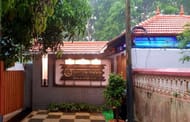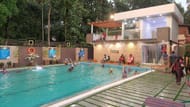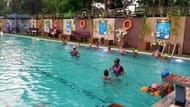There was a time when Sumi Cyriac was hailed as India’s Golden Girl in the pool.
She won a gold medal at the 1999 South Asian Federation (SAF) Games in Nepal, and two more at the 2004 SAF Games in Islamabad, Pakistan. All three titles were won in SAF record times.
However, the swimmer, who still holds the unique record of capturing 22 gold medals (eight of them in record times) at the All India Inter University Aquatics Championships, seems to have completely vanished from the public sphere.
Sure enough, a deep search of her name on the internet provides just a few vague Facebook references and links to decades-old news stories about her exploits in the pool.
The search for Cyriac’s present whereabouts led me to a little piece of land, which lies far away from the madding crowds of Changanacherry city (For those who are puzzled, it is a small town next to Kottayam, Kerala).
Take a turn at the city’s famous Saint Berchmans High School and you enter a road that is hardly wide enough to accommodate a single car at a time.
Travel through that road for around a kilometre and you reach the gates of a barely week-old establishment – International Swimmer Sumi Cyriac Academy. Once a queen of the pool, Sumi has now stepped up to the role of future king/queen maker.
The former swimmer, smartly clad in a pale blue tracksuit, smiled softly as I introduced myself. Standing in the middle of her dream space, a 25M pool filled with enthusiastic students and teachers, she seemed at peace with herself.
“What you see is a culmination of my dreams. When I hear children flapping their hands and legs in the pool, and their parents cheering for them on from the sidelines, that’s when I feel the happiest,” she said.
In a way, Sumi’s life has come a full circle. After all, her journey as a swimmer truly began when her father constructed a pool outside her house, at her hometown in Palai.
“I first started swimming when I was seven years old. My father Cyriac J Thoppil, an aquatics coach for the Kerala Sports Council, put me into the sport.
“When we didn’t have a proper pool to train nearby, my father dug a pool outside our house. It proved to be a huge turning point in my life, as well as those of my sisters Soumi, Somi and Soni,” she said.
All four sisters went on to represent India on the international stage, with Sumi being the most successful among them.
“I retired from the sport a few years back and currently work as a senior officer with the Indian Railways. I’ve always dreamt of coaching children and building them into the next generation of elite swimmers. The academy is the first step towards realising that dream,” she said.
Building the swimming pool was no easy task. But she believes the journey helped her grow in confidence.
“Building sports infrastructure in India is not an easy job. We started preparations for building this pool from a very long time ago. We identified several plots of land and zeroed in on this one.
“We had to go through several difficulties to get approval for building the pool. Since it’s a residential area, there was also a lot of opposition regarding responsible use of water. We managed to convince people that we took water management quite seriously. Now, our neighbours are our biggest supporters,” she said.
Within a few days of opening its doors, the word has got around and dozens of children have already begun training with Sumi. She said it was a very good feeling.
“One of our main concerns was whether people would go out of their way to reach and train here. We shouldn’t have worried. I’m already training three batches of 15 students each. Some of them are very promising and I’m confident they’ll reach great heights,” she said.
“I’ve also given some local school and college teams permission to use our facility for free training sessions. We really want to help develop the sport. At the moment, it’s fully privately funded. In five years, once we’ve some positive results to show, my hope is the government will support us, just like they do the Usha School of Athletics,” said Sumi.
After leading quite an eventful life in the pool, Sumi hardly has any time to rest. In the few minutes she chose to speak to me, she was interrupted at least a dozen times by young and old swimmers.
Each time, she smiled gracefully, excused herself and listened to their questions. She had an answer to all their queries and sufficient patience to explain it to them.
Stars of tomorrow cannot be nurtured without intimate, one-on-one coaching conversations. If patience is a virtue, then Sumi the teacher has been abundantly blessed.



